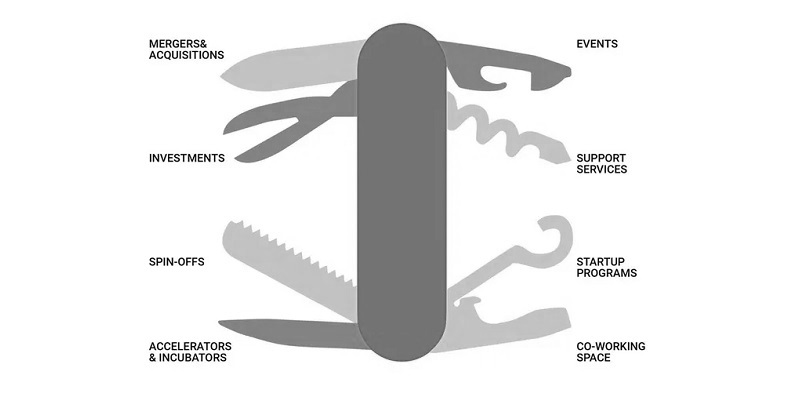Business Models for Corporate Accelerator

Business accelerators typically operate under a different business model. These models may vary based on the industry, focus, and goals of the accelerator. Here are some common business models for business accelerators:
- Equity Investment: Accelerators often take an equity stake in the participating startups. In return for funding, mentorship, and resources, the accelerator receives equity, usually ranging from 5% to 15% of the startup.
- Success Fees: Some accelerators may include a success fee or a percentage of the exit value when the startup is acquired or goes public.
- Program Fees: Startups pay a fixed fee to participate in the accelerator program. This fee covers the cost of mentorship, office space, and other resources provided during the acceleration period.
- Corporate or Industry Sponsorship: Some accelerators are sponsored by corporations or industry players. In this model, the sponsoring companies provide funding and resources in exchange for access to innovative startups and emerging technologies.
- Grant-Based Model: Accelerators may operate as non-profits or receive government support. In this case, they secure grants or public funding to run programs that support the growth of startups and contribute to economic development.
- Royalty-Based Model /Revenue Share: Instead of taking equity, accelerators may opt for a royalty-based model. Startups agree to share a percentage of their future revenue with the accelerator for a specified period after the program.
- Hybrid Models: Some accelerators adopt hybrid models, combining elements of equity-based, fixed-fee, and other models. This allows them to tailor their offerings based on the specific needs of startups and the goals of the accelerator.
- Industry-Specific Focus: Accelerators may specialize in specific industries or verticals, such as technology, healthcare, or fintech. This specialization can lead to partnerships with industry players and a more targeted approach to supporting startups.
- Online Platforms: With the rise of virtual and remote work, some accelerators operate entirely online. They may charge fees, take equity, or use a combination of models to support startups in a virtual environment.
- Service-Based Model: In addition to providing mentorship and resources, some accelerators offer specific services such as legal advice, marketing support, or design services. Startups pay fees for these additional services.
It is important to note that the success of an accelerator often depends on the quality of its mentorship, network, and the value it provides to startups. The specific business model chosen by an accelerator can impact its sustainability and the alignment of interests with the startups it supports.











